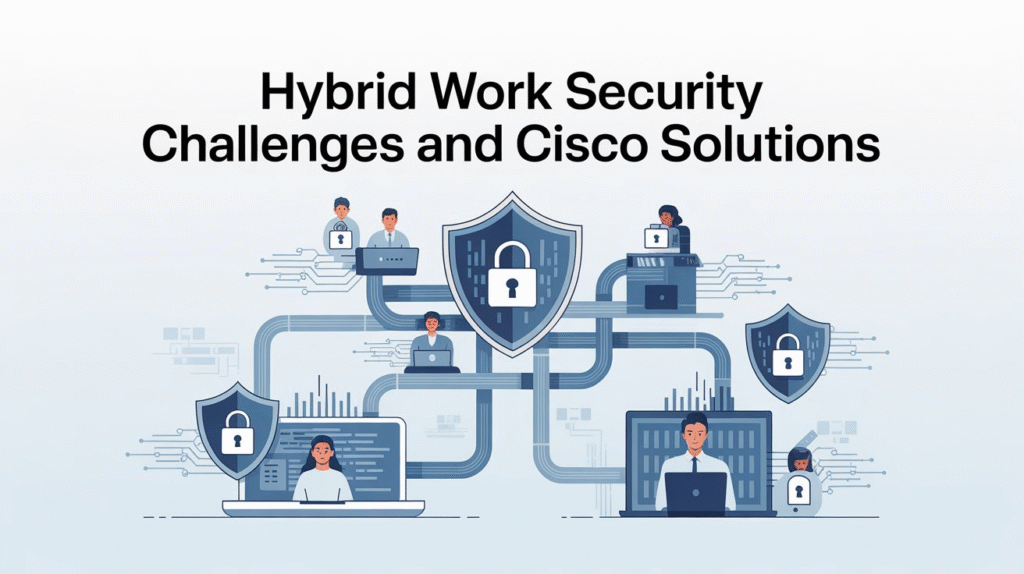
Hybrid Work Security Challenges have become a critical concern for organizations as the workplace evolves into a mix of in-office and remote work. This new model offers employees flexibility, improved work-life balance, and the potential for higher productivity. However, it also expands the organization’s attack surface, exposing sensitive data and systems to a variety of cyber threats. From unsecured remote access to misconfigured cloud applications, the risks are complex and constantly evolving.
To effectively address these challenges, IT professionals can greatly benefit from CCIE Security training in Bangalore, which provides in-depth expertise in advanced threat mitigation, endpoint protection, zero-trust architectures, and robust network security design, ensuring organizations stay resilient in hybrid environments.
Key Security Challenges in Hybrid Work Environments
Hybrid work introduces a blend of traditional and remote network risks. Understanding these challenges is crucial for developing a secure, resilient network infrastructure:
- Remote Access Vulnerabilities
Employees now access sensitive corporate data from home, co-working spaces, or public networks. Weak VPN configurations, outdated client software, and unsecured Wi-Fi connections can create easy entry points for cybercriminals. Real-world incidents show that misconfigured VPNs were exploited in several high-profile breaches in 2023. - Endpoint Security Risks
Laptops, tablets, smartphones, and IoT devices outside the office network can become attack vectors. Malware, ransomware, and spyware infections are common. Endpoint detection and response (EDR) solutions are critical for monitoring unusual behaviors, quarantining threats, and maintaining device integrity. - Phishing and Social Engineering
Attackers exploit human psychology to gain access to corporate systems. Hybrid employees often rely on email, chat apps, and collaboration platforms, increasing exposure to phishing, business email compromise (BEC), and credential theft. - Cloud Security and Data Privacy
Hybrid work relies heavily on cloud applications like Microsoft 365, Google Workspace, and SaaS tools. Misconfigured access controls or excessive permissions can lead to data leaks and non-compliance with regulations such as GDPR or HIPAA. Shadow IT—the use of unapproved cloud apps—is another growing concern. - Insider Threats
Insider risks, whether malicious or accidental, are heightened in hybrid environments. Employees may unintentionally expose sensitive data through insecure channels or removable media, while disgruntled insiders might intentionally compromise security. Behavioral analytics can help identify anomalous patterns early. - Complex Network Management
Managing hybrid networks requires balancing secure access with productivity. Organizations must implement distributed firewalls, segmentation, secure Wi-Fi, zero-trust access, and SD-WAN architectures—all without introducing performance bottlenecks.
Cisco Solutions for Hybrid Work Security
Cisco provides an integrated suite of security solutions designed to address hybrid work challenges comprehensively:
| Security Challenge | Cisco Solution | Key Features |
| Remote Access Vulnerabilities | Cisco AnyConnect VPN & Duo MFA | Secure VPN connections, multi-factor authentication, device posture checks |
| Endpoint Security Risks | Cisco Secure Endpoint (AMP) | Advanced malware protection, EDR, threat intelligence, behavioral analysis |
| Phishing & Social Engineering | Cisco Email Security & Umbrella | Anti-phishing, threat intelligence, cloud-delivered security, DNS-layer filtering |
| Cloud Security & Data Privacy | Cisco Secure Cloud Analytics & SecureX | Visibility into cloud activity, anomaly detection, compliance reporting |
| Insider Threats | Cisco Secure Network Analytics & Stealthwatch | Behavioral monitoring, anomaly detection, automated alerts and incident response |
| Complex Network Management | Cisco Zero Trust Architecture & SD-WAN | Centralized policy enforcement, secure segmentation, optimized traffic routing |
How Cisco Addresses Hybrid Security
- Zero Trust Architecture: Cisco applies the principle “never trust, always verify,” requiring continuous validation for all users, devices, and applications.
- Threat Intelligence: Cisco Talos provides real-time global threat insights, enhancing detection and response capabilities.
- Integrated Security Platform: Cisco SecureX connects multiple security tools, offering a unified dashboard, automation, and rapid threat remediation.
- Behavioral Analytics: Machine learning algorithms detect deviations from normal activity, helping prevent insider threats or compromised endpoints.
By leveraging these solutions, organizations can maintain high security standards without disrupting the employee experience.
Best Practices for Securing Hybrid Work
Organizations can complement Cisco’s technology with strategic practices:
- Implement Zero Trust Principles: Authenticate and authorize every device and user. Segment networks to limit lateral movement.
- Strengthen Endpoint Security: Use EDR, regular patching, and anti-malware solutions.
- Educate Employees: Conduct continuous awareness training for phishing, social engineering, and data-handling policies.
- Monitor Network Activity: Deploy continuous monitoring, logging, and automated threat detection for proactive incident response.
- Enforce Multi-Factor Authentication (MFA): Protect access to critical systems, reducing risk from credential theft.
- Regular Cloud Configuration Audits: Ensure SaaS, IaaS, and PaaS environments follow best security practices and compliance standards.
Training and Expertise for Security Professionals
Hybrid work security requires expertise in complex network architectures and advanced threat management. CCIE Security training in Bangalore provides hands-on experience with Cisco solutions like Secure Endpoint, Umbrella, Stealthwatch, SD-WAN, and Zero Trust Architecture. Professionals learn to design resilient security frameworks, implement threat intelligence, and respond effectively to incidents—skills that are increasingly in demand in enterprises adopting hybrid work models.
Conclusion
Hybrid Work Security Challenges have become a significant concern as organizations increasingly adopt flexible work models that combine remote and in-office environments. While this approach boosts productivity and employee satisfaction, it also exposes enterprises to complex cybersecurity risks, including unsecured endpoints, phishing attacks, cloud misconfigurations, and insider threats. Protecting sensitive data and maintaining operational continuity requires a strategic approach that combines technology, policy, and continuous monitoring.
To address these evolving threats, IT professionals can benefit from CCIE Security training course in Bangalore, which provides comprehensive knowledge, hands-on experience with Cisco security solutions, and practical skills in implementing zero-trust frameworks, endpoint protection, and advanced threat mitigation for hybrid enterprise networks.